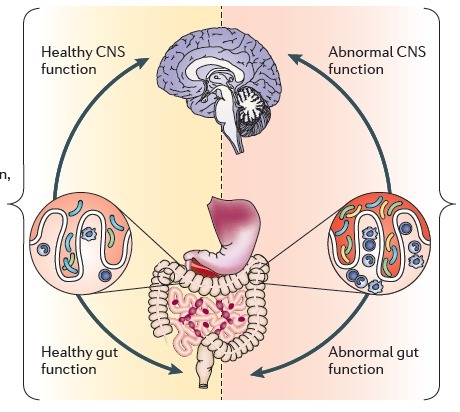
Search
Statistics
We have 222 registered usersThe newest registered user is raheelmemon
Our users have posted a total of 1140 messages in 613 subjects
If you are seeing this, you have attempted to link to the UpToDate widget but are experiencing a problem. Please visit UpToDate for more information.

Altered Fecal Microbiota Composition in Patients with Major Depressive Disorder.
FORUM FOR PSYCHIATRY RESIDENTS :: Psychiatry :: Psychiatry-Neurology-Psychology discussion :: Psychiatry In Depth
Page 1 of 1
 Altered Fecal Microbiota Composition in Patients with Major Depressive Disorder.
Altered Fecal Microbiota Composition in Patients with Major Depressive Disorder.
Altered Fecal Microbiota Composition in Patients with
Major Depressive Disorder
Major Depressive Disorder
Source: Jiang, H., et al. Brain, Behavior, and Immunity, 13 April 2015.

Accumulating evidence from animal studies supports the hypothesis that gut microbiota play an important role in central nervous system function, namely through inflammation, and the HPA axis, and by affecting neurotransmission.
Human studies have demonstrated increased bacterial translocation in mood disorders such as depression.
METHODS:
- Age: 18–40 years
- 46 patients with depression= 29 with active MDD and 17 with responded MDD.
- 30 healthy controls (HCs)
- Exclusion criteria: hypertension; cardiovascular disease; diabetes mellitus; obesity; liver cirrhosis; fatty liver disease; irritable bowel syndrome; inflammatory bowel disease; drug or alcohol abuse in the last year; use of antibiotics, probiotics, prebiotics, or synbiotics in the month before collection of the fecal sample; and known active bacterial, fungal, or viral infections.
RESULTS:
- Bacterial diversity was significantly higher in the A-MDD group than that in HC group, as indicated by the Shannon index.
- This increased fecal bacterial diversity was not found in the responded-MDD (R-MDD) vs. the HC group.
- Bacteroidetes, Proteobacteria, and Actinobacteria strongly increased in level, whereas that of Firmicutes was significantly reduced in the A-MDD and R-MDD groups compared with the HC group.
- MDD groups had increased levels of Enterobacteriaceae and Alistipes but reduced levels of Faecalibacterium.
- Negative correlation was observed between Faecalibacterium and the severity of depressive symptoms.
CONCLUSIONS:
These findings enable a better understanding of changes in the fecal microbiota composition in such patients, showing:
- either a predominance of some potentially harmful bacterial groups or
- reduction in beneficial bacterial genera.
 Similar topics
Similar topics» Combining Vitamin D to Fluoxetine for Major Depressive Disorder
» Midlife vs Late-Life Depressive Symptoms and Risk of Dementia
» Possible reason for Major Depression: Problem with Working Memory
» JAMA: Rates of Major Depressive Disorder and Clinical Outcomes Following Traumatic Brain Injury
» The Safety and Efficacy of Varenicline for Smoking Cessation in Patients with Schizophrenia or Schizoaffective Disorder.
» Midlife vs Late-Life Depressive Symptoms and Risk of Dementia
» Possible reason for Major Depression: Problem with Working Memory
» JAMA: Rates of Major Depressive Disorder and Clinical Outcomes Following Traumatic Brain Injury
» The Safety and Efficacy of Varenicline for Smoking Cessation in Patients with Schizophrenia or Schizoaffective Disorder.
FORUM FOR PSYCHIATRY RESIDENTS :: Psychiatry :: Psychiatry-Neurology-Psychology discussion :: Psychiatry In Depth
Page 1 of 1
Permissions in this forum:
You cannot reply to topics in this forum

» L-Methylfolate: Who Will benefit
» Vitamins & Supplements in Clinical Practice.
» Imaging Biomarkers for Outcomes in Mild TBI
» Q.5 Clozapine Neutopenia
» Treating Disorders!
» Cortical Abnormalities in Adults & Adolescents with MDD
» Efficacy of Antipsychotics in Pediatric Acute Mania
» Obsessive Compulsive Disorder in Adults: Which Treatment is Better?